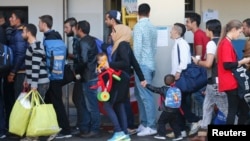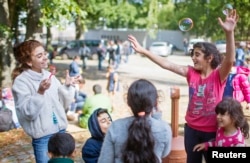Half a million migrants and refugees are known to have entered the European Union during the first eight months of 2015. That number may increase to more than one million before the year is through. The figure does not include individuals who got into the EU undetected.
Germany is a destination of choice for most migrants, attracted by the generous benefits they can claim and the government’s message that refugees are welcome.
The current refugee and migrant crisis on Europe’s doorstep is a daunting challenge, said Annette Heuser, executive director of the Washington-based Bertelsmann Foundation, in a VOA interview.
“The refugee crisis that Europe is facing right now is the most historic challenge that Europe has faced since World War II," she said. "It is the ultimate stress test for the club of 28 member states. It puts everything, how the club is governed, to the table right now. Everything needs to be discussed, from border controls to quotas for the refugees.”
Heuser admits Europe neglected the mounting migration crises for too long while preoccupied with its own financial crisis and Greek debt negotiations.
“And right now, we are definitely not prepared to deal with the huge amount of refugees that are ending up not only on our borders, but in our countries every day now… This has to be addressed immediately on the level of heads of states, because if we don’t solve the crisis, then it will create a lot of turmoil within the European Union,” said Heuser.
Merkel's leadership
Once more, the rest of Europe expects German Chancellor Angela Merkel to take the lead, said Heuser.
“It is interesting to see that we witness again the lack of leadership on the level of the European Union, and again everyone is looking to Berlin," she said. "We have seen that Chancellor Merkel is a very careful leader. She is not jumping to conclusions very quickly, she takes her time to analyze the problem as she did with the Greek crisis before, and the financial crisis, and right now with the refugee crisis. And it also took her quite a while to come out with a statement and a clear position how to move forward.”
Chancellor Merkel is calling for a unified, coordinated European system for handling migrants and asylum seekers — and for generosity, said Heuser.
Germany plans to do its part, she adds. By the end of this year, Germany will take in 800,000 refugees and for the next five years, half-a-million refugees annually.
Heuser contends that despite formidable difficulties, Europe’s present crisis offers a new, long-term vision for Europe.
The massive influx of migrants and refugees will require a huge effort in preparing European citizens for a societal change not seen in recent history. But the potential benefits, Heuser argues, could be equally astounding.
“The European Union of the future, as it looks right now, will be a multi-cultural, multi-religious club, and the European Union needs to address the challenge of how to integrate the refugees," she said. "If they do it right, they have an enormous opportunity to become, to a certain extent, the United States of Europe and to become the United States of the 21st century.”





